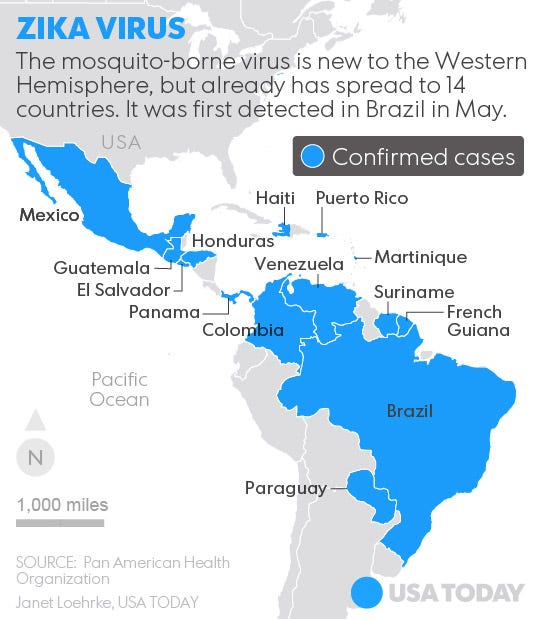CDC issues travel alert on Zika virus, which is linked to birth defects

The Centers for Disease Control and Prevention issued a travel alert Friday evening, warning people about the risk of traveling to countries in the Americas affected by the Zika virus, a mosquito-born illness linked to an epidemic of birth defects in Brazil.
Pregnant women should avoid traveling to areas with Zika outbreaks, the CDC said. Women who cannot avoid traveling should consult their doctors and take steps to avoid mosquito bites, such as wearing long sleeves and pants. Women thinking of becoming pregnant should also consult their doctors before traveling to outbreak zones.
Puerto Rico reported its first case of Zika in December. The case was diagnosed in someone who had not traveled outside of Puerto Rico, suggesting that Zika is spreading there.
Other countries affected by the Zika virus in the Americas include Brazil, Colombia, El Salvador, French Guiana, Guatemala, Haiti, Honduras, Martinique, Mexico, Panama, Paraguay, Suriname and Venezuela, according to the Pan American Health Organization.
Although Zika infection normally causes mild symptoms — or no symptoms at all — health officials are concerned because the outbreak in Brazil has corresponded with an enormous increase in the rate of microcephaly, a birth defect in which babies are born with small heads and incomplete brain development.
Brazil also has reported dozens of cases of Guillain-Barre syndrome, a rare immune system disorder that can cause temporary paralysis, that appear related to Zika virus.
Brazil, which normally has 100 to 200 cases of microcephaly per year, has reported more than 3,500 cases of the birth defect in just the past few months. Some of the babies have died.
Five things to know about the Zika virus
Zika, which until recently was limited to narrow belt of equatorial Africa and Asia, made its first appearance in Brazil in May. Brazil's health ministry announced the increase in microcephaly in November. The timing supports the notion that women who gave birth to babies with microcephaly could have been infected early in pregnancy.
Although U.S. health officials have refrained from definitively saying that Zika causes microcephaly, scientists have recently gained new evidence linking the two. Tests have found the Zika virus in the brains of two full-term infants with microcephaly who died just after birth; genetic analyses show that the virus was the same as the Zika virus now circulating in Brazil, according to the CDC.

Scientists have been taken aback by how quickly Zika is moving through the Americas.
In a study published in Memórias do Instituto Oswaldo Cruz, researchers noted that Zika could have spread to Brazil during the 2014 World Cup games, given that there were Zika outbreaks in some Pacific island nations at the same time.
According to the CDC, "because the Aedes species mosquitoes that spread Zika virus are found throughout the world, it is likely that outbreaks will spread to new countries."
As diseases proliferate, mosquitoes becoming Public Enemy No. 1
Zika can be difficult to diagnose, because its symptoms are similar to those of dengue fever,also known as "break bone fever" because of the severe joint pain it causes, and chikungunya, which first arrived in the Western Hemisphere in 2013 and whose African name means "bent over," because of the stooped posture that the disease causes. All three diseases are spread by the same species of mosquito, the Aedes, which also live in much of the USA. In Africa, where Zika virus was first diagnosed in the 1940s, doctors have noticed that Zika outbreaks often follow on the heels of chikungunya outbreaks.
In recent years, tropical diseases have spread beyond their usual neighborhoods, fueled by global travel and commerce, human migration and even international events such as the World Cup, said Peter Hotez, dean of the National School of Tropical Medicine.
Symptoms of Zika include mild fever, rash, headaches, joint pain, muscle pain, asthenia, weakness and pink eye, which set in three to 12 days after a person is bitten by an infectious mosquito. Symptoms are often mild, lasting two to seven days. Three out of four infected people have no symptoms at all, according to the Pan American Health Organization.
Hawaii hit with outbreak of dengue fever, also known as 'breakbone fever'
